Related Research Articles
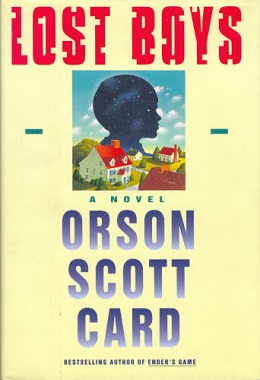
Lost Boys (1992) is a horror novel by American author Orson Scott Card. The premise of the novel revolves around the daily lives of a Mormon family, and the challenges they face after a move to North Carolina. The story primarily follows the family's troubles at work, church, and the oldest child Stevie's difficulty fitting in at school, which lead to him becoming increasingly withdrawn.
Narrative poetry is a form of poetry that tells a story, often using the voices of both a narrator and characters; the entire story is usually written in metered verse. Narrative poems do not need to rhyme. The poems that make up this genre may be short or long, and the story it relates to may be complex. It is normally dramatic, with various characters. Narrative poems include all epic poetry, and the various types of "lay", most ballads, and some idylls, as well as many poems not falling into a distinct type.
The Ender's Game series is a series of science fiction books written by American author Orson Scott Card. The series started with the novelette Ender's Game, which was later expanded into the novel of the same title. It currently consists of sixteen novels, thirteen short stories, 47 comic issues, an audioplay, and a film. The first two novels in the series, Ender's Game and Speaker for the Dead, each won both the Hugo and Nebula Awards.

The Tales of Alvin Maker is a series of six alternate history fantasy novels written by American novelist Orson Scott Card, published from 1987 to 2003, with one more planned. They explore the experiences of a young man, Alvin Miller, who realizes he has incredible powers for creating and shaping things around him.

Seventh Son (1987) is an alternate history/fantasy novel by American writer Orson Scott Card. It is the first book in Card's The Tales of Alvin Maker series and is about Alvin Miller, the seventh son of a seventh son. Seventh Son won a Locus Award and was nominated for both the Hugo and World Fantasy Awards in 1988. Seventh sons have strong "knacks", and seventh sons of seventh sons are both extraordinarily rare and powerful. In fact, young Alvin appears to be the only one in the world. His abilities make him the target of the Unmaker, who recognizes Alvin's powers as those of a Maker, only the second ever, and it had been a long time since the first had walked on water and turned water to wine. The Unmaker works largely by water and tries to kill Alvin in his early years before he can master his abilities.
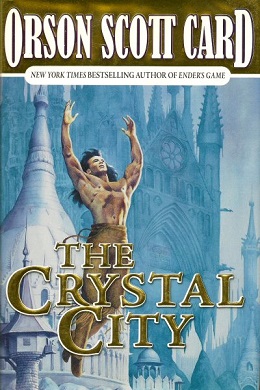
The Crystal City (2003) is an alternate history/fantasy novel by American writer Orson Scott Card. It is the sixth book in Card's The Tales of Alvin Maker series and is about Alvin Miller, the seventh son of a seventh son.

Red Prophet (1988) is an alternate history/fantasy novel by American writer Orson Scott Card. It is the second book in Card's The Tales of Alvin Maker series and is about Alvin Miller, the seventh son of a seventh son. Red Prophet won the Locus Award for Best Fantasy Novel in 1989, was nominated for the Nebula Award for Best Novel in 1988, and the Hugo Award for Best Novel in 1989.
Tor Ulven was a Norwegian poet. He is considered one of the major poets of the Norwegian post-war era, and won several major literary prizes in Norwegian literature.
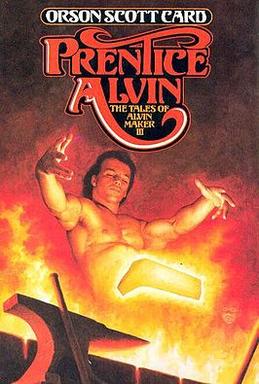
Prentice Alvin (1989) is an alternate history/fantasy novel by American writer Orson Scott Card. It is the third book in Card's The Tales of Alvin Maker series and is about Alvin Miller, the seventh son of a seventh son. Prentice Alvin won the Locus Award for Best Fantasy Novel in 1990, was nominated for the Nebula Award for Best Novel in 1989, and the Hugo Award for Best Novel in 1990.

Maps in a Mirror (1990) is a collection of short stories by American writer Orson Scott Card. Like Card's novels, most of the stories have a science fiction or fantasy theme. Some of the stories, such as "Ender's Game", "Lost Boys", and "Mikal's Songbird" were later expanded into novels. Each of the smaller volumes that make up the larger collection as a whole are centered on a theme or genre. For instance, Volume 1, The Changed Man, reprints several of Card's horror stories. The collection won the Locus Award in 1991.

Heartfire (1998) is an alternate history/fantasy novel by American writer Orson Scott Card. It is the fifth book in Card's The Tales of Alvin Maker series and is about Alvin Miller, the seventh son of a seventh son. Heartfire was nominated for the Locus Award in 1999.

Alvin Journeyman (1995) is an alternate history/fantasy novel by American writer Orson Scott Card. It is the fourth book in Card's The Tales of Alvin Maker series and is about Alvin Miller, the seventh son of a seventh son. Alvin Journeyman won the Locus Award for Best Fantasy Novel in 1996.
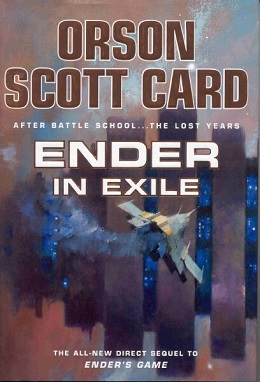
Ender in Exile is a science fiction novel by American writer Orson Scott Card, part of the Ender's Game series, published on November 11, 2008. It takes place between the two award-winning novels Ender's Game and Speaker for the Dead. It could also be considered a parallel novel to the first three sequels in the Shadow Saga, since the entirety of this trilogy takes place in the span of Ender in Exile. The novel concludes a dangling story line of the Shadow Saga, while it makes several references to events that take place during the Shadow Saga. From yet another perspective, the novel expands the last chapter of the original novel Ender's Game. On the one hand, it fills the gap right before the last chapter, and on the other hand, it fills the gap between the last chapter and the original (first) sequel. Ender in Exile begins one year after Ender has won the bugger war, and begins with the short story "Ender's Homecoming" from Card's webzine Intergalactic Medicine Show. Other short stories that were published elsewhere are included as chapters of the novel.
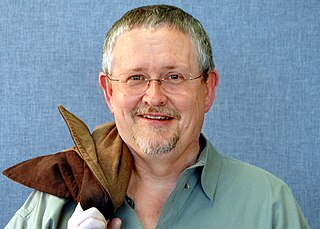
Orson Scott Card is an American writer known best for his science fiction works. He is the first and only person to win a Hugo Award and a Nebula Award in consecutive years, winning both awards for his novel Ender's Game (1985) and its sequel Speaker for the Dead (1986). A feature film adaptation of Ender's Game, which Card co-produced, was released in 2013. Card also wrote the Locus Fantasy Award-winning series The Tales of Alvin Maker (1987–2003).
The Orson Scott Card bibliography contains a list of works published by Orson Scott Card.
"Gert Fram" is a short story that by American author Orson Scott Card. It appears in his short story collection Maps in a Mirror, but it originally appeared in the July 1977 fine arts issue of Ensign magazine under the pen name Byron Walley. It is Card's first published work.

"West" is a short story by American writer Orson Scott Card, originally published in his short story collection The Folk of the Fringe. Card previously published a shorter version of this story in the collection Free Lancers: Alien Stars IV (1987).
"Salvage" is a short story by American writer Orson Scott Card, originally published in the February 1986 issue of Asimov's Science Fiction magazine. It appears in Card's short story collection The Folk of the Fringe and was also reprinted in the anthologies Wastelands: Stories of the Apocalypse and The End of the World: Stories of the Apocalypse.
"Pageant Wagon" is a short story by American writer Orson Scott Card. It first appeared his in his short story collection The Folk of the Fringe, and was followed by a release in Isaac Asimov's Science Fiction Magazine (August, 1989)
"Ender's Game" is a science fiction novelette by American writer Orson Scott Card. It first appeared in the August 1977 issue of Analog magazine and was later expanded into the 1985 novel Ender's Game. Although it serves as the foundation of the Ender's Game series, the novelette is not considered to be properly a part of the Ender's Game universe, as there are many discrepancies in continuity between it and the novel.
References
- ↑ Alvin Maker series "Orson Scott Card's website The Hatrack".
- ↑ Card, Orson Scott (1990). Maps in a Mirror . New York, NY: Tor Books. p. 540. ISBN 0-312-85047-6.
- ↑ Authors’ Awards from Bibliography of Mormon Speculative Fiction.
- ↑ Card, Orson Scott (1987). Seventh Son . New York, NY: Tor Books. pp. Afterward. ISBN 0-312-93019-4.